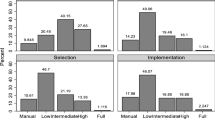Abstract
Truth is a fundamental objective of adjudicative processes; ideally, ‘substantive’ as distinct from ‘formal legal’ truth. But problems of evidence, for example, may frustrate finding of substantive truth; other values may lead to exclusions of probative evidence, e.g., for the sake of fairness. ‘Jury nullification’ and ‘jury equity’. Limits of time, and definitiveness of decision, require allocation of burden of proof. Degree of truth-formality is variable within a system and across systems.
Similar content being viewed by others
Author information
Authors and Affiliations
Rights and permissions
About this article
Cite this article
Summers, R.S. Formal Legal Truth and Substantive Truth in Judicial Fact-Finding -- Their Justified Divergence in some Particular Cases. Law and Philosophy 18, 497–511 (1999). https://doi.org/10.1023/A:1006327205902
Issue Date:
DOI: https://doi.org/10.1023/A:1006327205902




